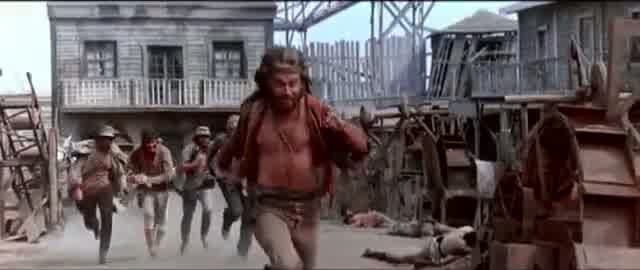Regie:
Enzo G. CastellariKamera:
Aiace ParolinBesetzung:
Franco Nero, William Berger, Olga Karlatos, Orso Maria Guerrini, Woody Strode, Antonio Marsina, Joshua Sinclair, Victoria Zinny, Alfio Caltabiano (mehr)Inhalte(1)
Als der Indigene Keoma nach dem Bürgerkrieg in seine Heimat zurückkehrt, muss er feststellen, dass das Land von einer Pockenseuche heimgesucht wurde. Überall türmen sich Leichenberge, viele Menschen haben sich angesteckt. Doch damit nicht genug: In seinem Dorf hat der miese Gangster Caldwell das Kommando übernommen und terrorisiert mit einer Bande von Ex-Soldaten die Einwohner. Unterstützt wird er dabei ausgerechnet von Keomas Stiefbrüdern. Caldwell lässt alle Erkrankten in eine verlassene Mienensiedlung pferchen, wo sie von jeglicher medizinischer Versorgung abgeschlossen sind. Die Infizierten sollen dort sterben, alle, die versuchen zu fliehen, werden hinterrücks erschossen. Mit Hilfe des ehemaligen Sklaven George will Keoma der Terrorherrschaft ein Ende setzen. Ein blutiger Kampf beginnt. (BR Fernsehen)
(mehr)Kritiken (3)
Es ist schon lange her, dass ich von einem Spaghettiwestern so wie von Keoma begeistert war. Er ist umso interessanter, wenn er (soweit ich weiß) nichts mit Sergio Leone oder Ennio Morricone zu tun hat. Der Film ist in allen Hinsichten toll. Eine auf den ersten Blick einfache, aber großartig dargestellte und im Endeffekt auch schicksalhafte Geschichte, viele ausgezeichnete Figuren, eine hinreißende Regie (die Leone gleichkommt), eine einprägsame Musik, die Schauspieler*innen… Wie schon gesagt, alles ist fantastisch.
()
"The world keeps going around and around so you always end up in the same place." Keoma represents Freedom, the old hag with the cart symbolizes Death, and the unborn child stands for Life. Symbolism, mysticism, Shakespeare, Peckinpah. Now you have the necessary clues to navigate the somewhat patchy story of the continually revised script and understand why Franco Nero, after returning from Woodstock, immediately dove into producing slowly dying unfree villains while playing the music recordings made there. The spaghetti is gone, the circle is closed. Franco can return Björn Borg’s wig. "He can't die. And you know why? Because he's free. And a man who's free never dies."
()
One of the most visually impressive (late) spaghetti westerns, with polished widescreen compositions that even Leone himself would envy. A pleasantly atypical western with avant-garde editing (ingeniously combining past and present), an almost post-apocalyptic atmosphere of a dusty city decimated by plague (the night scenes lit by torches are reminiscent of the Middle Ages), religious symbolism and a charismatic Franco Nero with the visage of Jesus. It's a hodgepodge of everything from Shakespeare to Bergman to Peckinpah, but surprisingly it works as a whole. The only thing that throws it off is the bizarre soundtrack, with its whiny ballad songs in which two singers comment directly on what's happening in the film.
()

